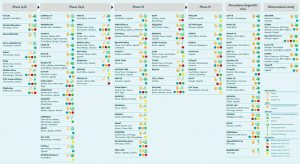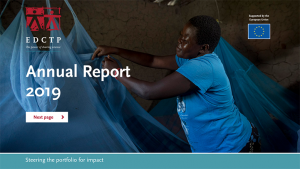Annual Report 2019 – steering a portfolio for impact
EDCTP’s Annual Report 2019 summarises the activities of the Partnership in 2019, shows the steady growth, scope and cohesion of the project portfolio, and highlights the progress made towards the objectives of the programme.
EDCTP investments
Ten new calls for proposals were launched in 2019, bringing the total number of EDCTP2 calls to 53. By the end of 2019, the number of grants had reached 271. These grants support activities at more than 200 institutions in 37 countries in sub-Saharan Africa and 150 institutions in 16 European countries. Moreover, the cumulative EDCTP2 grant funding reached a total of more than €526 million, a figure that is still rapidly rising.
Investments by the member countries
EDCTP activities – financed by the European Union, EDCTP member countries and other parties through EDCTP – are reinforced by many projects financed and run by EDCTP member countries independently. These projects are counted as part of the programme when they contribute to the objectives of the programme. In this way, through collaboration and alignment on objectives, a collective push to impact is created. EDCTP member countries have invested more than €1.06 billion in these so-called Participating States’ Initiated Activities which comprise 280 European and 120 African projects.
“No country can tackle these health challenges alone. Success will depend on focused efforts through regional partnerships and North-South collaborations. More than ever, global health is truly global.”
Professor Yazdan Yazdanpanah, Chair of the EDCTP General Assembly
Steering a portfolio for impact
Through careful steering, the EDCTP project portfolio has not only become larger but also shows well-targeted R&D investments on priority areas. The regularly updated EDCTP strategic research agenda is informed by the discussions in the Scientific Advisory Committee, the General Assembly and with international partners. This consultative and collaborative approach directs our annual funding rounds towards addressing research and capacity priorities as well as long-term regional and national needs.
Dr Michael Makanga, EDCTP Executive Director: “Under the current programme, we have established an extensive portfolio in our priority areas. We also continue to examine how best to ensure the success of projects and their legacy, and how to scale up bridging the gap between science and policy for health. All to ensure that people in need reap the rewards of research.”
See the project portfolio in detail
The results of the approach are clear in areas where EDCTP has built strength, such as TB vaccine development, malaria drug development, preparedness for health emergency research, and capacity development.
EDCTP is funding three clinical trials of TB vaccine candidates, namely MTBVAC-Newborns (€5.5 million), POR-TB (€13.8 million) and priMe €12.5 million). To improve efficiency and impact of these projects, in 2019 EDCTP also funded the Tuberculosis Vaccine Initiative (TBVI, the Netherlands) to provide additional resources and coordination to the three large and complex TB studies, while the Amsterdam Institute of Global Health and Development (AIGHD, the Netherlands) was funded to support a global consultation and drafting of a new Global TB Vaccine R&D roadmap.
In funding malaria studies, EDCTP has invested strongly in portfolio approaches to the development of new antimalarials and vaccines. Medicines for Malaria Venture (MMV) coordinates the PAMAfrica consortium (€22 million) that is progressing a portfolio of drug products. The global collaborative WANECAM-II project (€10 million), coordinated from Mali, is testing an antimalarial from an entirely new class. A portfolio approach also characterises the MMVC project (€15 million) coordinated from Oxford (United Kingdom). It targets all key stages of the malaria parasite life cycle with different vaccine candidates. The PfTBV portfolio project (€18 million), also coordinated from Mali, pursues the evaluation of three candidate vaccines that may block the completion of the parasite life cycle in mosquitoes.
The West Africa Ebola Virus Disease (EVD) epidemic in 2014-2016, has put the threat of epidemics caused by emerging and re-emerging infectious diseases high on the agenda. EDCTP has activated its Emergency Funding Mechanism twice, in 2016 for EVD and 2020 for COVID-19. Moreover, EDCTP has funded two large consortia to build capacity in outbreak detection and response through collaboration between European and African institutions. The consortia are ALERRT (the African coalition for epidemic research, response and training; €10 million, coordinated from the United Kingdom), and PANDORA-ID-NET (the Pan-African network for raid research, response, relief and preparedness for infectious diseases epidemics; €10 million, coordinated from Congo). Both consortia have rapidly pivoted to the COVID-19 pandemic.
Dr Makanga: “We can say with confidence that we are on track to meet our programme objectives. The ground is being laid not only for the introduction of new or improved medical interventions but also for national health research systems.”
EDCTP’s consistent investments in capacity development will leave a durable legacy. The development of research capacity and the capacity for research ethics review and regulatory oversight has already made a difference beyond projects alone. Whether through fellowships for all career stages, networks of excellence and research consortia, or cross-border networks and North-South collaborations, the value of investing in African research capacity has become evident in the way this expertise and these platforms are currently used to confront the COVID-19 pandemic in sub-Saharan Africa.
- Find a summary version of the Annual Report 2019 (PDF).

